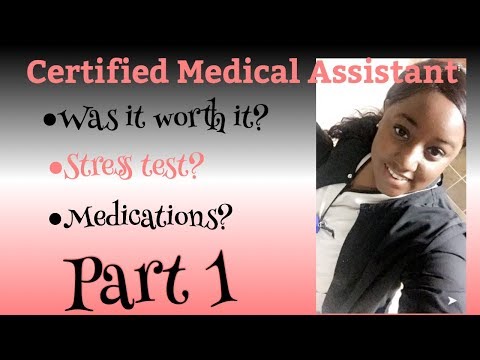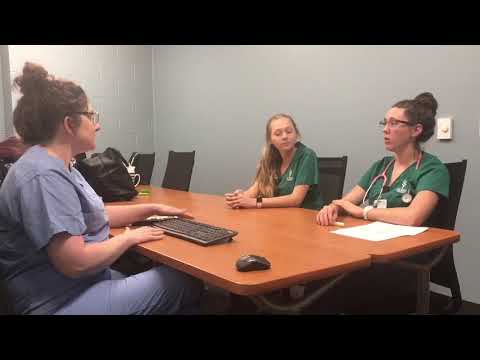Cardiology Jobs for Medical Assistants
Contents
- Cardiology Jobs: An Overview
- The Duties of a medical assistant in Cardiology
- The Qualifications Needed to Become a Medical Assistant in Cardiology
- The Best Places to Look for Cardiology Jobs
- The Application Process for Cardiology Jobs
- The Interview Process for Cardiology Jobs
- The Salary and Benefits of Cardiology Jobs
- The Pros and Cons of Working in Cardiology
- 10 Reasons to Consider a Career in Cardiology
- 5 Tips for Securing a Cardiology Job
If you’re a medical assistant interested in working in cardiology, check out this blog post. We’ll discuss what cardiology jobs are available for Medical assistants what the duties of these positions entail, and what the job market looks like for this specialty.
Checkout this video:
Cardiology Jobs: An Overview
Medical Assistants who want to specialize in cardiology have several job options. They can work in hospitals, clinics, or doctor’s offices. Some medical assistants work in research laboratories. Others work for companies that make medical devices or equipment.
Most cardiology medical assistants work in outpatient care centers. They help patients with heart conditions by doing tasks such as taking medical histories, checking blood pressure, and preparing patients for examinations. They also may give medications and injections, take electrocardiograms, and arrange for hospitalizations and other treatments.
Some cardiology medical assistants work in coronary care units (CCUs). These units are special areas in hospitals where patients with heart problems are treated. CCU medical assistants help care for patients who have had heart attacks, heart surgery, or other serious heart problems.
Job titles for cardiology medical assistants include electrocardiograph (EKG) technician, cardiovascular technician, and cardiac monitor technician.
The Duties of a medical assistant in Cardiology
The duties of a medical assistant in cardiology include taking patient medical histories and performing diagnostic tests. They also help care for patients with heart conditions and educate them on how to manage their condition. Medical assistants may also be responsible for scheduling appointments and billing insurance companies.
The Qualifications Needed to Become a Medical Assistant in Cardiology
There are a few qualifications that are necessary to become a medical assistant in cardiology. The most important qualification is probably a certification from the American Association of Medical Assistants (AAMA). The AAMA offers a certification exam that, upon successful completion, will certify an individual as a medical assistant. In order to sit for the exam, an individual must have graduated from an accredited medical assisting program.
In addition to the AAMA certification, many employers also prefer medical assistants to have CPR certification. This can be obtained through the Red Cross or other organizations that offer CPR training.
Some cardiology offices may also require medical assistants to have basic EKG training. This training can often be completed through community colleges or hospitals.
Having one or more years of experience working as a medical assistant is also helpful when applying for cardiology jobs. Many employers prefer to hire candidates who have some experience in the field.
Those who are interested in working as a medical assistant in cardiology should possess good communication skills and be able to work well under pressure. Cardiology offices can be fast-paced environments, so it is important for medical assistants to be able to stay calm and organized while still providing excellent patient care.
The Best Places to Look for Cardiology Jobs
According to the Bureau of Labor Statistics, there are around 673,000 medical assistants currently employed in the United States If you are a medical assistant who is looking for a job in cardiology, there are a few things that you can do to improve your chances of finding employment.
First, you should make sure that your resume is up-to-date and reflects your skills and experience. You should also consider joining professional organizations such as the American Association of Medical Assistants (AAMA) or the National Healthcare Association (NHA). These organizations offer a variety of resources that can help you find a job, including job postings and career fairs.
Additionally, you can search for cardiology jobs on websites like Indeed.com orMonster.com. These websites allow you to search for jobs by location, keyword, or company name. You can also set up alerts so that you will be notified when new jobs are posted that match your criteria.
Lastly, networking is crucial when it comes to finding a job in any field. You should reach out to your friends, family members, and acquaintances to see if they know of any open positions or businesses that are hiring medical assistants. Attending job fairs is also a great way to network with potential employers.
The Application Process for Cardiology Jobs
The application process for cardiology jobs can be competitive. Here are some tips to help you get started:
1. Start by research the different types of cardiology jobs that are available. This will help you narrow down your options and focus your job search.
2. Once you have an idea of the type of job you want, start researching specific cardiovascular programs that interest you. This will help you identify potential employers and learn more about the requirements for each position.
3. When you have identified a few programs that you are interested in, begin the application process. This typically includes completing an online application, submitting a resume, and participating in an interview.
4. Be prepared to demonstrate your knowledge of cardiovascular medicine during your interview. Candidates who are able to articulate their passion for cardiology and show a strong knowledge of the field are typically more successful in securing a position.
The Interview Process for Cardiology Jobs
The interview process for cardiology jobs may vary depending on the employer, but there are some common steps that candidates can expect. The first step is usually a phone screen, followed by an in-person interview. The interviewer will ask questions about your experience, skills, and qualifications. They may also give you a tour of the facility and introduce you to the staff. After the interview, you will likely be asked to complete a writing or skills test. Finally, the employer will make a job offer.
The Salary and Benefits of Cardiology Jobs
The median salary for cardiology jobs is $33,000 per year, with the most experienced professionals earning upwards of $48,000 annually. Benefits package typically include health insurance paid vacation and sick days, and 401(k) plans.
The Pros and Cons of Working in Cardiology
Cardiology is a field of medicine that deals with the diagnosis and treatment of conditions and diseases of the heart. It is a highly specialized area of medicine, and as such, working in cardiology can be both challenging and rewarding. Here are some pros and cons to consider if you are thinking about pursuing a career in cardiology.
Pros:
– Cardiology is a rapidly growing field of medicine, so there are plenty of job opportunities available.
– Cardiology is a highly specialized field, so you will have the opportunity to work with some of the best doctors and medical staff in the country.
– Working in cardiology can be very rewarding, both personally and professionally. You will have the opportunity to make a difference in people’s lives and help them manage their heart health.
Cons:
– Cardiology is a highly specialized field, so you will need to undergo extensive training before you can qualify for a job.
– Because it is such a specialized field, working in cardiology can be very demanding and stressful. You will need to be able to handle high-pressure situations and have excellent attention to detail.
10 Reasons to Consider a Career in Cardiology
While a career in cardiology may not be for everyone, it does offer many perks and benefits that other medical careers don’t. If you’re considering a career in cardiology, here are 10 reasons to help you make your decision.
1. Cardiology is a rapidly growing field.
2. You’ll have the opportunity to work with world-renowned physicians.
3. You’ll have the opportunity to work with cutting-edge technology.
4. You can specialize in a variety of areas.
5. You can work in a variety of settings.
6. The pay is good.
7. The job outlook is positive.
8. You can make a difference in people’s lives.
9. You’ll never get bored.
10. There are many resources available to help you succeed
5 Tips for Securing a Cardiology Job
There is a lot of competition for jobs in the cardiology field, but there are ways to make yourself stand out from the rest of the pack. Here are five tips for securing a cardiology job:
1. Get experience. You will be more attractive to employers if you have experience working in a related field, such as cardiac rehabilitation or cardiovascular surgery.
2. Get certified. Being certified as a medical assistant shows employers that you have the skills and knowledge required to perform your job duties successfully.
3. Use your network. Talk to people you know who work in the cardiology field and see if they have any recommendations for jobs or employers.
4. Stand out from the crowd. When applying for jobs, take the time to customize your cover letter and resume to each position. This will show employers that you are truly interested in working for them.
5. Be persistent. Don’t give up if you don’t hear back from an employer right away. Keep networking and applying for jobs until you finally land the perfect position.”







